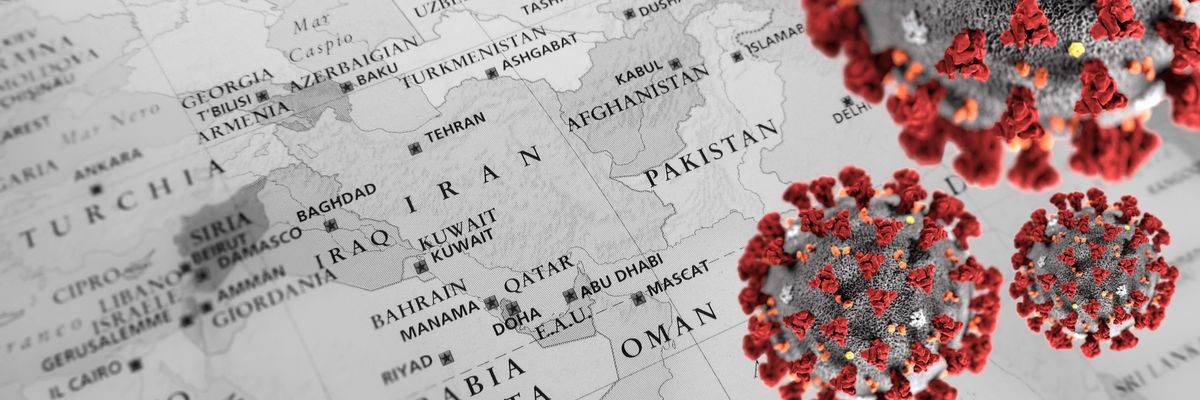After years of bludgeoning during Donald Trump’s presidency, the Iran nuclear deal, or JCPOA, the most intrusive and comprehensive nuclear inspection regime imposed on any nation, is on life support.
Although both the Iranian government and the new Biden administration are eager for the deal to survive, neither side appears willing to take the crucial first step towards ensuring its survival.
Despite the real security and economic benefits that Iran can hope to gain from the deal’s full revival, it remains, for very good reasons, unenthusiastic about taking the first steps towards compliance before U.S. sanctions are lifted.
From Iran’s vantage point, it was the United States under Trump that withdrew from the JCPOA in the first place, despite the International Atomic Energy Agency’s repeated verification of Iran’s full compliance with the deal’s provisions. This breach was then compounded when Trump illegally reimposed on Iran some of the most ferocious sanctions ever imposed on any nation.
But despite being denied the financial and diplomatic dividends it was promised under the deal, Iran would continue to show good faith by remaining in compliance for some time after Trump’s withdrawal. It only began to gradually reduce its compliance after the remaining signatories to the deal (Britain, France, Germany, China, and Russia) fell in line behind Trump’s ravaging sanctions to avoid the secondary sanctions punishment for continuing to do business in Iran. Even as it reduced compliance, Iranian leaders continued to signal their readiness to return to full compliance if the other parties, chief among them the United States, returned to fulfilling its obligations under the deal.
To add insult to injury, Trump, committed to snuffing the faintest scintilla of life out of the deal, ordered the assassination of Iran’s top general Qassem Soleimani. The assassination of Iranian nuclear scientist Mohsen Fakhrizadeh, widely believed to be an Israeli hitjob, would entomb any last hope of reviving the deal under a Trump presidency.
For the last four years, the United States has been an unmitigatedly bad faith actor towards Iran. Today, the onus of proving good faith rests squarely on its shoulders, not on Iran’s. From the Iranian perspective, moving towards compliance while under sanctions is to establish a dangerous precedent: under the right amount of pressure, Iran can and will buckle.
For the American side of the equation, lifting the Trump-era sanctions will yield a palpable security benefit, since it will force Iran to scale back its nuclear program. This is not mere conjecture. Both Iranian President Hassan Rouhani and Foreign Minister Javad Zarif have expressed their unequivocal commitment to an immediate return to full compliance as soon as the sanctions have been lifted. Iran, whose economy, as well as its fight against COVID-19, have been severely impaired by Trump’s sanctions, does not need to be enticed or pulled into compliance with the JCPOA; a faint nudge should more than suffice.
The Biden administration’s stated interest in the JCPOA’s revival notwithstanding, it has shown reluctance to cut the first turf. Instead, it has made its return to the JCPOA conditional on Iran’s full compliance with the deal’s provisions.
But there may be a way for the Biden administration to untangle the deadlock without going against its stated position. This would entail looking beyond the security framework and, instead, using humanitarian language and action as a stepping stone for reviving the JCPOA.
President Biden has already ordered the highest levels of his administration to “promptly review existing United States and multilateral financial and economic sanctions to evaluate whether they are unduly hindering responses to the COVID-19 pandemic” and to give him recommendations “for any changes in approach.” It is hard to imagine a report wherein Iran does not occupy a prominent position.
By imposing sanctions on Iran, cutting it off from the global financial system, and preventing the International Monetary Fund from granting it an emergency loan to combat COVID-19, the Trump administration hindered Iran’s access to medical supplies and hobbled the government’s ability to shut down the economy, necessary measures for containing the pandemic.
Biden will have a unique opportunity to respond to the recommendations that will likely come before him with utmost generosity, thereby lifting some of the most crippling sanctions imposed on Iran, but under the guise of humanitarian concerns.
The lifting of some sanctions, albeit for humanitarian reasons, will make it easier for Iran to reciprocate this expression of good faith by scaling back, albeit slightly, its nuclear program. Indeed, even when U.S.-Iran relations were at their most acrimonious in the past, humanitarian considerations have succeeded in overriding the usual rules of engagement between two sides.
A notable precedent is the Bush administration’s humanitarian aid to Iran during the 2003 earthquake in Iran’s ancient city, Bam. For the first time in decades, U.S. military personnel and transport planes were allowed to enter Iranian territory to assist with aid efforts. To the Bush White House’s admission, during this time the U.S. government “work[ed] with Iranian authorities … to help the people of Iran during this challenging time.”
Given both governments’ vested interest in preserving the JCPOA, there already exists a fertile political environment for such a humanitarian gesture to trigger a reciprocal Iranian response, which can lock the involved parties in a spiral of de-escalation and ultimately salvage the JCPOA.
A rapprochement framed in humanitarian terms will allow both sides to move closer to compliance with the JCPOA without requiring them to backtrack on their stated opposition to laying the first stone. They will have participated in saving a deal they are both keen to preserve while saving face.
To traverse beyond the current impasse, the U.S. and Iranian governments may take a leaf out of Sun Tzu’s timeless wisdom: “Build your opponent a golden bridge to retreat across."
For the United States and Iran, that golden bridge is today a humanitarian one.
















